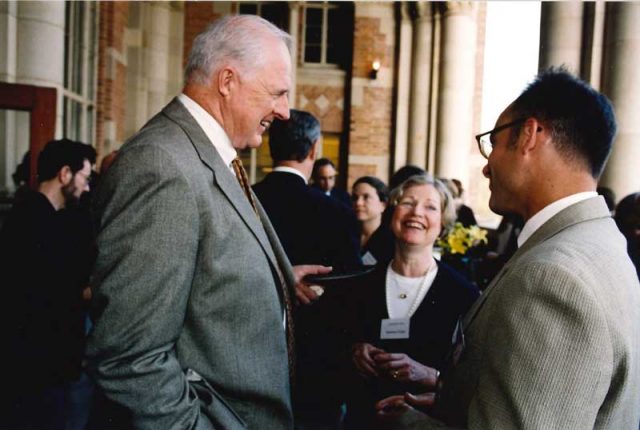
We are saddened to hear that Ed Condren, Professor Emeritus in UCLA’s English Department, passed away recently. Professor Condren was a long-time member of CMRS. For many years, he actively participated in the Center’s conferences, symposia, and other activities. All of us at CMRS are grateful to Professor Condren for the expertise and friendship he shared with us over the years.
In memoriam Edward Condren
By former CMRS Director, Andy Kelly
Our colleague Ed Condren passed away on April 1, 2020. He was eighty-five years old. He joined the UCLA English Department in 1967, along with the late Chuck Berst and Andy Kelly (author of this memoir). Chuck took VERIP III in 1993, Andy became emeritus at seventy in 2004, but Ed, a very popular mainstay in the early English survey, 10A, remained until 2009 at the age of nearly seventy-five, setting a record at that time for longevity.
Edward Ignatius Condren was born in New York in 1934. He attended Fordham University during the Korean Conflict and majored in Russian Studies. During those years he set his sights on an acting career, along with his roommate, Alan Alda, and they used to do gigs together in Manhattan (I witnessed a moving reunion of the two in the 1990s when Alda was playing at UCLA’s Huntington Hartford Theater in Hollywood). When Ed received his BA in 1956, he moved from the Naval ROTC to the Navy itself, serving as a carrier-based aviator, remaining for seven years; and during this time he married Gail Hurliehy and had their two sons, Sean and Hilary, and two daughters, Sloane and Ellen. Naval Air was a dangerous profession, and Ed and Gail sometimes had the duty of informing the new widows of the loss of their pilot husbands, like the scenes described by Tom Wolfe in The Right Stuff. Ed himself lost two planes because of mechanical failures, but fortunately was able to push the ejection buttons in time (he spoke of the sensation of floating down in his parachute over the Mediterranean on a beautiful day).
Towards the end of his career in the Navy, Ed enrolled at Cornell University for a Master’s degree in English literature, which he received in 1964, and then entered the doctoral program at the University of Toronto, not in English, but in Medieval Studies, covering Old English, historical linguistics, Old Norse, Old French, and Middle High German. As ABD in 1967, Ed accepted the offer to join UCLA, and piled his large family and St. Bernard dog into a station wagon for the 3000-mile trip to Los Angeles. They had picked out Sherman Oaks on the map as a place to settle, but overshot it by a few minutes on the new, and still empty, Ventura Freeway and unknowingly settled in Thousand Oaks, on a spacious estate in horse country.
In two years he completed his dissertation, which was on Chaucer studies, but, unusually, instead of revamping it into a book for his tenure promotion, he submitted six articles on widely varying subjects: not only Chaucer, but also Chrétien de Troyes, Icelandic sagas, Beowulf, and the troubadours of Provence. He was promoted to Associate Professor in 1973. Even though he taught graduate courses and directed dissertations, Ed’s forte was as an enthusiastic undergraduate teacher, and he was especially valuable in teaching 10A, which introduced generations of English majors to our early literature, from Old English through Chaucer, Shakespeare, and Milton, and instilled in them a love of literary culture that would remain with them for life.
His scholarship continued at the article and book-review and conference-paper level until later, when he produced a series of three books, Chaucer and the Energy Creation: The Design and the Organization of the Canterbury Tales (1999); The Numerical Universe of the Gawain-Pearl Poet: Beyond Phi (2004); and Chaucer from Prentice to Poet: The Metaphor of Love in Dream Visions and Troilus and Criseyde (2008). The last was an expansion of his original dissertation. He was at work on an edition of the Gawain-Pearl manuscript long into his retirement, until his health began to fail.
During the Vietnam protests, as a conservative military man, Ed was a founder of an anti-anti-war group, Concerned University Faculty (CUF). More important, he co-founded the UCLA Faculty Association, which succeeded in acquiring and increasing many benefits for the professorial staff.
Like many of our medical and scientific and social-science colleagues, but unlike most humanities professors, Ed had an interesting side-profession. He served as a forensic English scholar, and expert witness, specializing in language use, including defamation (e.g. for Rip Torn, in Torn v. Dennis Hopper, 1994—Torn won); copyright infringement, theft of ideas, and unauthorized use of intellectual property (e.g., against Stephen King, in King v. Allied Vision, 1992—King won); and the dissolution of community literary property (e.g., Carl and Linda Sagan, for Linda). His most famous case was the libel suit of Jerry Falwell against Larry Flynt over a satirical ad in Hustler. Even though Ed had been active in the anti-pornography group Citizens for Decency through Law (CDL), he testified in support of the first-amendment rights of Flynt, which were verified in a unanimous decision of the US Supreme Court, Hustler Magazine v. Falwell, in 1988.
Ed was an outstanding athlete, especially in golf, tennis, and skiing (in college he made the Fordham basketball team), and a lively raconteur, living up to his early theatrical aspirations. He had a flair for the dramatic, both in and out of the classroom. We missed Ed’s gregarious nature when he and his beloved Gail left Los Angeles permanently for Lake Tahoe, and we were very sorry to hear of his recent decline and final demise. He was a character worthy of the great literature he taught, and his passing will be sorely lamented.

